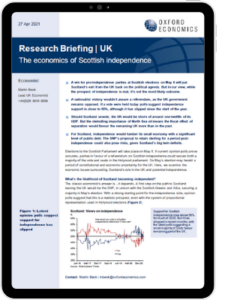UK | The economics of Scottish independence

A win for pro-independence parties at Scottish elections on May 6 will put Scotland’s exit from the UK back on the political agenda. But in our view, while the prospect of independence is real, it’s not the most likely outcome. A nationalist victory wouldn’t assure a referendum, as the UK government remains opposed.
What you will learn from this report:
- A nationalist victory wouldn’t assure a referendum, as the UK government remains opposed.
- Should Scotland secede, the UK would be shorn of around one-twelfth of its GDP.
- For Scotland, independence would lumber its small economy with a significant level of public debt.
Tags:
Related Services

Post
Food prices to bottom out in 2024, risks skewed to upside
Our baseline forecast is for world food commodity prices to register an annual decline this year, in aggregate, reducing pressure on food retail prices further downstream. However, we believe the risks to this forecast are overwhelmingly skewed to the upside.
Find Out More
Post
Battery raw material prices to recover
Battery raw materials prices bottomed out last quarter and we think a sustained recovery is looming. Midstream EV battery manufacturing activity has picked up again and inventories have returned to historical levels, suggesting upstream demand for raw materials will also bounce back.
Find Out More